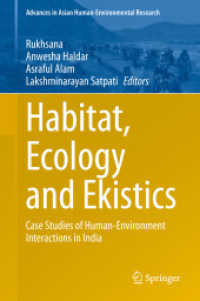Full Description
Insurgent Urbanisms are often seen as spontaneous, grassroots responses to the inequities embedded in urban policies, projects, and systems, operating entirely outside the structures of government. But are they truly autonomous? In Insurgent Urbanisms in the Americas, Kristine Stiphany and Edna Ely Ledesma offer a new perspective on the empirics of struggles to design cities that are inclusive and equitable.
From Brazil's favelas to Ecuador's barrios, and Puerto Rico's hurricane-battered shores to the gentrified centers of U.S. cities, there have been radical struggles of the marginalized to challenge and reimagine the norms of urban planning. Over decades, these same struggles have become part of planning itself. Each chapter's account of insurgency provides empirical detail about how acts of resistance evolve across housing occupations, grassroots knowledge-sharing, ecological revolutions. Stiphany and Ely-Ledesma provide a way of understanding how the marginalized mobilize their sociospatial systems—such as housing, markets, policies, and urban morphology—to participate in the change that is transforming their own communities. Through powerful field research and firsthand activism, contributors reveal how insurgencies not only resist but actively reshape urban orders, built environments, and public landscapes—issuing a compelling call to make urbanism matter.
This book is essential for students and instructors of urban planning and design, Latin American and Hispanic studies, and social justice studies, as well as city planning and urban design practitioners.
Contents
Foreword Preface 1. Introduction: Insurgent Urbanisms Part 1. Origins: Insurgency and Urban Housing 2. Between local initiatives and policy responses: The Chilean experience of rental housing 3. Between Minimum Space and Maximum Profitability: New Forms of Residential Precarity in Rental Housing in Chile 4. From Utopia to Vernacular: Social Housing, Informality, and Right to the City in Guayaquil, Ecuador 5. Housing struggles and organizing in the wake of financialization in Mexico 6. Other Schools: Educational Infrastructures on São Paulo's Peripheries 7. A Brief Genealogy of Peripheral Insurgencies in São Paulo, Brazil Part 2. Transformations: Insurgency and Knowledge Co-Construction 8. Faith-Based Organizations: A Pathway to Insurgent Planning in Seattle? 9. Community counter-mapping for urban upgrading in Fortaleza, Brazil 10. Attempts at Homogenization, Hybridization, and Contestation at the México/United States borderlands 11. 'Socially charged possibilities': Are political-spatial formulations in São Paulo reflective of a right to the city? 12. Affordable but Unhealthy: A Partial Right to the City in South Texas informal subdivisions Part 3. Evolutions: Insurgency and Environmental Justice 13. From Environmental Criminalization to Insurgent Environmental Justice: Occupying And Holding Ground In São Paulo's Southern Periphery 14. Balancing Access and Regenerating Habitats: Towards a Socio-Ecological Integration in the Rio Grande/Río Bravo Delta 15. Designing a New City Place: Green Infrastructure on the U.S.-Mexico Border 16. From infrastructure to environmental justice: The case of a multiracial unincorporated community in North Texas 17. Resisting Colonialismo Ambiental and Colonialismo Desastre: The Case of Casa Pueblo in Puerto Rico 18. Reframing Waller Creek: Landscape as an agent of urban change 19. Conclusion: American Urbanism After a Right to the City








